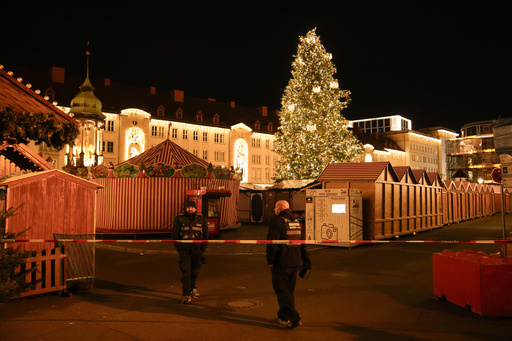MAGDEBURG, Germany — A car crashed into a crowded outdoor Christmas market in the eastern city of Magdeburg on Friday evening, resulting in the deaths of at least two people and injuring more than 60 others in what authorities described as a premeditated assault.
The driver of the vehicle was apprehended shortly after the incident, which occurred around 7 p.m. when the market was bustling with holiday shoppers eager to participate in festive activities over the weekend.
Footage confirmed by onlookers and made available through German news outlets captured the moment the suspect was taken into custody. A police officer was seen pointing a gun at the driver, who was lying on the ground. Additional officers quickly arrived to assist in the arrest.
The two confirmed victims included an adult and a young child, with officials cautioning that the death toll could rise, considering that 15 individuals sustained serious injuries in the incident.
The attack sent shockwaves through the city, bringing the mayor to tears and casting a shadow over what is typically a joyous occasion deeply rooted in German tradition. This tragic event also led several other towns across Germany to cancel their Christmas markets, both as a precautionary measure and in solidarity with Magdeburg.
The driver, identified as a 50-year-old Saudi physician who has lived in Germany since 2006, was confirmed by the state interior minister, Tamara Zieschang. He has been practicing medicine in Bernburg, which is located approximately 40 kilometers (25 miles) south of Magdeburg.
Saxony-Anhalt’s governor, Reiner Haseloff, assured reporters that the suspect appears to have acted alone, indicating that there is no ongoing threat to the public. “Each life lost in this attack is a horrific tragedy and one too many,” he stated.
Magdeburg, the capital of Saxony-Anhalt, has a population of around 240,000 and lays west of Berlin. This assault echoes a similar tragedy from eight years ago when an assailant drove a truck into a Christmas market in Berlin, resulting in 13 deaths and numerous injuries; that attacker was killed in a subsequent confrontation in Italy.
Christmas markets are an integral part of German culture, representing a cherished holiday tradition that dates back to the Middle Ages and has been adopted by many places worldwide. In Berlin alone, over 100 markets opened late last month, filling the air with the aromas of mulled wine, roasted almonds, and bratwurst. Various markets can be found throughout the nation.
Despite months of preparation, German Interior Minister Nancy Faeser noted in late November that there were no specific threats to this year’s Christmas markets, but urged people to remain cautious.
In the immediate aftermath of the tragic event, the sound of sirens echoed amid the festive decorations, including stars and green garlands. Eyewitness Dorin Steffen, who had been attending a concert nearby, recounted the loud noise, which signaled something severe had transpired.
Steffen expressed her grief, calling the day “dark” for the city and shared sentiments for those affected. “We are all in shock and pray for the victims and their families,” she added, hoping for the safety of friends and relatives.
The ramifications of the attack resonated beyond Magdeburg, as Haseloff labeled it a catastrophe for the city and the entire nation. He announced flags in Saxony-Anhalt would be flown at half-staff, a gesture that would also be mirrored by the federal government.
“This is indeed one of the most dreadful events that could occur, especially during a time designated for festive cheer,” Haseloff remarked.
Chancellor Olaf Scholz expressed his condolences on social media, stating, “My thoughts are with the victims and their families. We stand with them and the residents of Magdeburg.” Other notable figures, including NATO’s secretary-general and the president of the European Commission, also conveyed their sympathies online.
Magdeburg’s Mayor Simone Borris, visibly emotional, announced plans for a memorial service at the city’s cathedral the following day.
Moreover, following a soccer match that night between Bayern Munich and Leipzig, Bayern’s CEO, Jan-Christian Dreesen, called for a minute of silence in memory of the victims.


